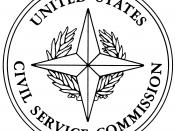The political activity of government employees has been a concern of elected officials since the earliest days of the Republic. Thomas Jefferson, the nation's third President, was among the first to express concern about this issue.
In response to Jefferson's concern, the heads of the executive departments issued an order which stated that while it is "the right of any officer or federal employee to give his vote of others nor take any part in the business of electioneering, that being deemed inconsistent with the spirit of the Constitution.
In 1939, Congress approved landmark legislation known as the Hatch Act, which limits the political activities of federal employees, employees of the District of Columbia government and certain employees of state and local governments.
Before 1979, the U.S. Civil Service Commission had primary responsibility for enforcing the Hatch Act. The Hatch Act restricts the activity of individuals principally employed by state or local executive agencies who work in connection with programs financed in whole or in part by federal loans or grants.
Hatch Act provisions also apply to employees of private, nonprofit organizations, which plan, develop and coordinate federal Head Start or Economics Opportunity programs. The quality of our public school directly affects us all as parents, as students, and as citizens. Yet too many children in America are segregated by low expectations, illiteracy, and self-doubt. In a constantly changing world that is demanding increasingly complex skills from its workforce, children are literally being left behind academically.



Informative.
Informative and directly to the point. Need more examples and stuff to make it better though.
0 out of 0 people found this comment useful.